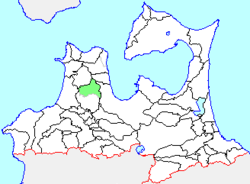Kanagi, Aomori
|
Kanagi 金木町 |
|
|---|---|
| Former municipality | |
 Location of Kanagi in Aomori Prefecture |
|
| Location in Japan | |
| Coordinates: 40°54′9.4″N 140°27′43.3″E / 40.902611°N 140.462028°ECoordinates: 40°54′9.4″N 140°27′43.3″E / 40.902611°N 140.462028°E | |
| Country | Japan |
| Region | Tōhoku |
| Prefecture | Aomori Prefecture |
| District | Kitatsugaru |
| Merged | March 28, 2005 (now part of Goshogawara) |
| Area | |
| • Total | 125.97 km2 (48.64 sq mi) |
| Population (March 1, 2005) | |
| • Total | 10,557 |
| • Density | 83.8/km2 (217/sq mi) |
| Symbols | |
| • Tree | Hiba |
| • Flower | Sakura |
| • Bird | Skylark |
| Time zone | Japan Standard Time (UTC+9) |
Kanagi (金木町 Kanagi-machi?) was a town located in Kitatsugaru District in western Aomori Prefecture, Japan.
Kanagi was located in central Tsugaru Peninsula, in an area known for severe winter weather conditions and blizzards. The town was also known as the birthplace of famed author Osamu Dazai. The area was part of Hirosaki Domain during the Edo period. After the Meiji Restoration, Kanagi Village was created in 1898. It was raised to town status in 1920. In 1955, it annexed neighboring Kase and Kira villages.
On March 28, 2005, Kanagi, along with the neighboring village of Shiura (also from Kitatsugaru District), was merged into the expanded city of Goshogawara, and thus no longer exists as an independent municipality.
At the time of its merger, Kanagi had an estimated population of 10,557 and a population density of 83.8 persons per km². The total area was 125.97 km².
The town economy was dominated by commercial fishing and agriculture. The town was on Route 339 (Japan) highway, and Kase, Kanagi, Ashino-Kōen and Kawakura stations on the Tsugaru Line.
...
Wikipedia

